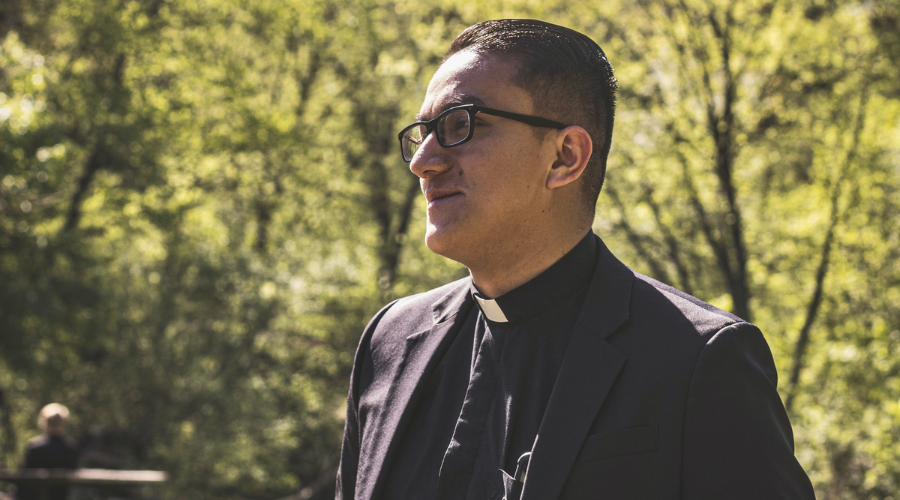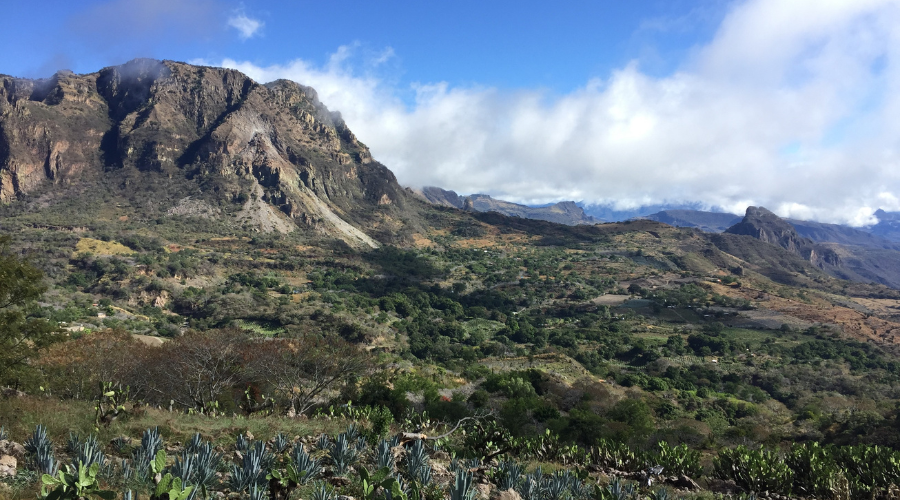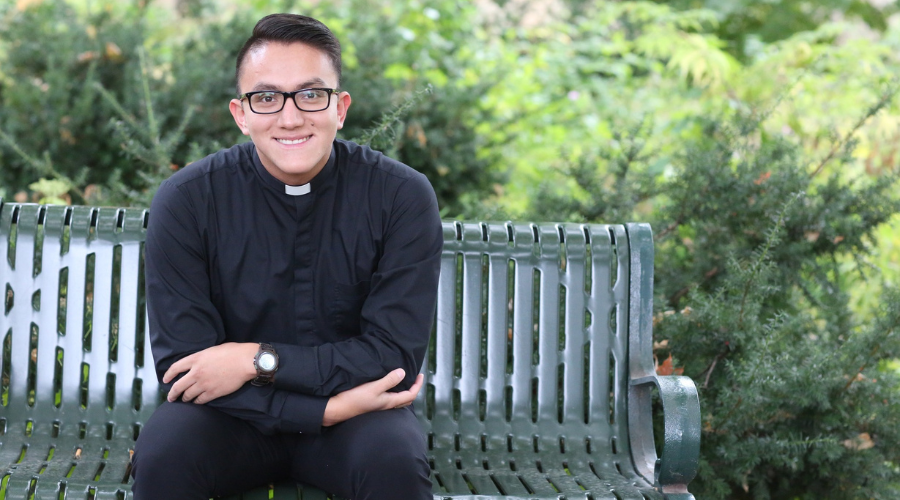
About an hour’s drive north of the outskirts of Guadalajara, the county of San Cristóbal de la Barranca claims status as the barranco mango capital of Mexico. The rugged region’s other main exports include tequila, plums and mariachi music.
Nestled inside the county, the tiny mountain enclave of Cuyutlán — the childhood home of recently-ordained Saint Paul Seminary alum Fr. Rodrigo Mayorga Landeros — is also known for its vibrant Catholic processions, including an annual St. Joseph patronal feast. Every year on March 19, Cuyutlán’s 800-some population splits into two groups, marching from opposite directions to converge on the church dedicated to St. Joseph in the middle of the village.
On March 18, 2007, Mayorga, his parents and two of his four siblings were heading home from the St. Joseph festivities and slipped off the road due to poor driving conditions.
Mayorga’s mother and brother died in the crash. Eleven-year-old Rodrigo survived, along with his sister and father.
But the man who will soon become a priest of the Diocese of Des Moines didn’t just lose his spiritual role model and closest brother in age that night. He lost his home. His friends. His school. In some ways, his heritage.
What followed was a harrowing journey back and forth between the United States and Mexico, through the challenges that face the children of U.S. immigrants, into the seminary and on to the priesthood. It will culminate June 24 when Mayorga is ordained at St. Ambrose Cathedral in Des Moines.
“I think what my life has taught me, and seminary formation, is how to be compassionate,” Mayorga said. “Despite everything, what I’ve experienced in life, from God, from others, is compassion.”
***
In Spanish, the name Ines means “pure, holy and chaste.”
For part of the year, Mayorga’s mother Ines Landeros raised him, his three older brothers and younger sister on her own. In the meantime, his father worked in the United States to provide for the family.

Having a migrant worker for a father wasn’t easy, but Ines’ devotion to Jesus and the Blessed Mother permeated their household. She also had help; the family spent most weekends with Ines’ mother, siblings and their children. Rodrigo has over 50 first cousins on his mother’s side.
The family lived on a small farm several miles outside of Cuyutlán, raising their own crops and animals. When he wasn’t working the land, Rodrigo could often be found leading his siblings around their property on make-believe pilgrimages or pretending to celebrate Mass on the altar he had in his bedroom. Franciscan missionaries frequented the town, especially during Holy Week, and Rodrigo wanted to be just like them – so much so that his mother, a seamstress, made him chasubles and stoles he could wear while imagining he was a priest.
Mexico is known today more for its cultural ties to Catholicism, but Mayorga says that’s not the case in his hometown. In addition to the regular processions, Sunday Mass was a part of everyday life. So was praying for favorable weather for their agricultural endeavors during the change of each season.
“Despite everything, what I’ve experienced in life, from God, from others, is compassion.”
— Deacon Rodrigo Mayorga
It was a local priest who, kneeling with Rodrigo in front of a crucifix inside their local church, told him his mother and brother had passed away because of the car accident.
“He did it with such gentleness,” Mayorga said. “That painted a really good picture of the priesthood and how God’s mercy is bestowed on us through them.”
After the accident in March, his father quickly realized the best future for his now single-parent family would come in the United States. Rodrigo finished the fifth grade in June; by the end of July, he, his father and sister had moved to the U.S., where they were reunited with their two oldest brothers.
“You know you’re leaving everything behind,” Mayorga said. “You’ve just recently been through a major loss – my mom and an older brother – but now I’m also losing country. I’m losing roots, family, cousins, friends, all of that – mangoes. I’m losing everything.
“And yet I knew I was with dad. That gave me a great sense of security. Moving to the States was more of an adventure than anything. I remember not ever thinking about it, whether I am committing a crime or not. I had no idea what the consequences of this action might be.”
It’s an unfathomable amount of change for an 11-year-old to endure.
“That was really hard,” Mayorga said. “But then, just in hindsight, I think, well, that was also really hard for my dad, who just lost a lot of things as well, for my other brothers and sisters. … I try to think of my 11-year-old [self] with a lot of compassion. And just thank him for not giving up, because at that age, you could easily give up on many things, and pick up many, many other things.”
***
Aside from its size, Osceola, Iowa has little in common with Cuyutlán.
When the Mayorga family settled there in 2007 alongside Rodrigo’s brothers – as well as a couple uncles and a handful of cousins – they traded in mountains for corn and soybean fields, a small family farm for a trailer park with giant agricultural plots in the background.
Rodrigo began classes at the local elementary school in August. A trip to Walmart for school supplies surprised him; he’d never been inside a big-box store in his life.
He also didn’t know a word of English.
“The first full sentence I learned how to say was incorrect,” he laughs now. “’He is my sister.’”
But not everything changed. His father made sure the family continued to attend Sunday Mass at St. Bernard in Osceola. Rodrigo befriended a couple of other Hispanics who helped him learn the language and culture. Within six months, he was proficient. By his sophomore year of high school, he had passed all his English Language Development Assessment exams.
“In hindsight, I see God’s guiding hand through this time of, transition, of loss, of trauma,” Mayorga said. “How did I deal with it? I think that just plowing through, hoping that the best would come out of it. But with no plan in sight, you know?”
The plan began to crystallize around the time Mayorga finished high school. Frankly not sure what to do next, he says he began praying on his own for the first time in his life. The rosary became a daily practice. He began going to Eucharistic adoration regularly.
One day in front of the monstrance, he asked the question.
“I asked God, ‘Why did you take away the person who loved me the most?’” Mayorga said. “And deep, deep, deep within me, I heard, ‘I never left you.’ And at that moment, I understood my mom really loved me. But God is the one who loves me the most. And he has never left me. And all of a sudden, that idea that I had as a kid, about priesthood, came back with a lot of strength.”
In February 2014, Mayorga was invited to a come to Saint John Vianney Seminary in Saint Paul for a weekend “Vianney Visit.” A “little scared but mostly intrigued,” he discovered that seminarians were ordinary young men trying to follow the Lord, he said. “What ended up selling seminary was a game of dodgeball.”
The 17-year old discovered that seminarians were not just buried underneath books, but that they lived a balanced life of fraternity, sports, fun and prayer. This gave him the courage to apply via the Diocese of Des Moines and give seminary a try.

Because of his legal status, Mayorga attended college seminary for four years at the Seminario Hispano de Santa Maria de Guadalupe in Mexico City – a seminary founded by Cardinal Norberto Rivera and a coalition of U.S. bishops specifically for “dreamer” cases like Mayorga’s. It was a risk; by leaving the United States undocumented, he could have been banned from reentry for at least a decade, he said.
As Mayorga discerned his next step should be major seminary, he petitioned for a student visa from the U.S. consulate in Mexico City. All the while, he received the full support of his diocese and then-Bishop Richard Pates.
And that’s how Rodrigo ended up at The Saint Paul Seminary.
He’ll miss the brotherhood here, but he’s looking forward to being closer to his immediate family members, who are all still in Osceola, about an hour’s drive south of Des Moines.
They were all at his ordination June 24. The locals back in Cuyutlán celebrated, too, including Mass offered for Rodrigo the week before he joins the presbyterate.
And he’s confident his mother and deceased brother are smiling down upon The Hawkeye State, as well.
“I kind of have this certainty that I have two mothers in heaven,” Mayorga said, “the Blessed Mother and my own biological mother.”
There are two traits he hopes to carry from his difficult road to the priesthood: benevolence and gentleness.
“I can point at the many times when somebody has suffered with me,” Mayorga said. “And I think that what I would like to exhibit in all of my priesthood in all of my life, is precisely that compassion.”
